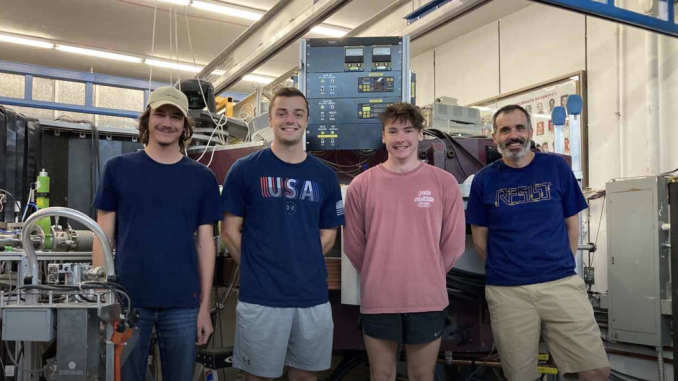
Kate Horan (kahoran@ursinus.edu)
With a new grant from the National Science Foundation, Ursinus College Professor of Physics, Lew Riley, and his research group of Ursinus students have earned funding to continue conducting their nuclear structure research. Describing the work performed by the group, Riley said, “My research group studies the interplay between the behavior of the individual protons and neutrons in atomic nuclei and collective behavior, in which a large number of protons and neutrons move together in nuclear vibrations or rotations. The protons and neutrons in atomic nuclei fill a series of orbits in a very similar way to electrons in atoms.”
Riley explained that during the summers of 2019-2022 at the Fox Lab at Florida State University (with a pause in 2020 due to Covid-19) his research group, the Ursinus College Nuclear Structure Group, has conducted a series of experiments “that help us map the single-neutron orbits.” This work at FSU helped Riley’s research group to better understand the collective behavior of neutrons in nuclei, and with the help of NSF’s funding, their research does not end there.
Riley’s research team is now preparing for a pair of experiments that they plan to run at the Facility for Rare Isotope Beams at Michigan State University (FRIB) in 2023. Riley explained that “these measurements are exciting, because we will be using a brand new, cutting edge accelerator facility to study an exotic nucleus, Si-42, that has twice as many neutrons as protons. We want to know whether the protons and neutrons behave differently when they are so far out of balance.”
Dylan Simms ’23 and Mill Heinze ’24, members of Riley’s research group, are excited to continue their nuclear structure research and further their knowledge in the nuclear field. Simms commented, “I am excited to see what more we can discover about Chromium 52, as well as what comes after the dp reactions of certain elements. I am also excited to learn more about how the process of the experiment can be further modified to give information that we might be limited to receiving.”
The research itself is important, but the experience is also very valuable. Heinze explained the educational importance of conducting this research, stating, “the experience gained from research was enormous, I was able to work [with] lots of different instruments and people from different levels of physics. I learned a lot from the professors and the graduate students while I was at Florida State. I plan on using this experience whenever I am in a lab again.” In addition to benefiting the Physics community with their findings, these students are gaining knowledge through their experience of conducting this research. Students in Riley’s research group are discovering new information while also cultivating key skills for further work in the field.
“Another exciting part is the possibility of a paper being published, being a small part of a larger piece of work that will be looked at across the Physics community is a really cool feeling,” said Heinze. This research is providing students with exciting opportunities to collaborate with others and develop new knowledge in a field that they are passionate about, and the grant from NSF will support the growth of more opportunities. With new funding and Riley leading the way, this group will continue their research, providing intellectual contributions to the Physics community and valuable experiences to Ursinus students.
